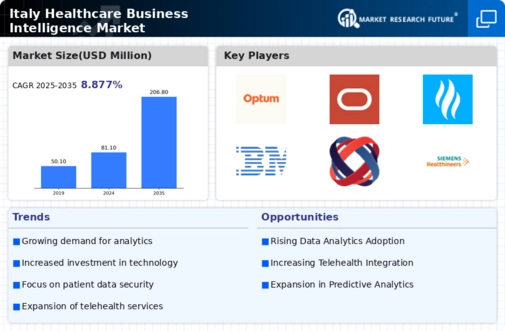Growing Emphasis on Patient-Centric Care
The healthcare business-intelligence market in Italy is increasingly influenced by a growing emphasis on patient-centric care. Healthcare providers are shifting their focus towards personalized treatment plans and improved patient engagement. This shift necessitates the use of advanced analytics to gather insights from patient data, enabling providers to tailor services to individual needs. Reports indicate that approximately 70% of healthcare organizations in Italy are investing in business intelligence tools to enhance patient experience. By utilizing data analytics, providers can identify patient preferences, track treatment outcomes, and improve communication. This driver not only enhances patient satisfaction but also contributes to better health outcomes, thereby reinforcing the importance of the healthcare business-intelligence market in the evolving healthcare landscape.
Advancements in Health Information Technology
Advancements in health information technology significantly impact the healthcare business-intelligence market in Italy. The rapid evolution of electronic health records (EHRs), telemedicine, and mobile health applications facilitates the collection and analysis of vast amounts of health data. As healthcare organizations adopt these technologies, the demand for sophisticated business intelligence solutions rises. It is estimated that the market for health information technology in Italy will reach €5 billion by 2026, driven by the need for improved data management and analytics capabilities. These advancements enable healthcare providers to derive actionable insights from data, ultimately leading to enhanced decision-making processes. Consequently, this driver underscores the critical role of technology in shaping the future of the healthcare business-intelligence market.
Rising Demand for Data-Driven Decision Making
The healthcare business-intelligence market in Italy experiences a notable surge in demand for data-driven decision making. Healthcare providers increasingly recognize the value of leveraging data analytics to enhance operational efficiency and patient outcomes. This trend is underscored by a reported growth rate of approximately 15% in the adoption of business intelligence tools among healthcare organizations. As hospitals and clinics strive to optimize resource allocation and improve patient care, the integration of advanced analytics becomes essential. The ability to analyze vast amounts of data allows healthcare professionals to identify trends, forecast patient needs, and streamline processes. Consequently, this driver significantly influences the healthcare business-intelligence market, as stakeholders seek innovative solutions to meet the evolving demands of the healthcare landscape in Italy.
Increased Focus on Cost Management and Efficiency
The healthcare business-intelligence market in Italy is witnessing an increased focus on cost management and operational efficiency. As healthcare costs continue to rise, organizations are compelled to seek innovative solutions to optimize expenditures. Business intelligence tools provide valuable insights into resource utilization, enabling healthcare providers to identify areas for cost reduction. Reports suggest that healthcare organizations that implement business intelligence solutions can achieve cost savings of up to 20%. This driver reflects the urgent need for healthcare providers to enhance financial sustainability while maintaining high-quality care. By leveraging data analytics, organizations can streamline operations, reduce waste, and improve overall efficiency, thereby reinforcing the significance of the healthcare business-intelligence market in addressing these challenges.
Government Initiatives Supporting Digital Transformation
Government initiatives play a pivotal role in shaping the healthcare business-intelligence market in Italy. The Italian government has launched various programs aimed at promoting digital transformation within the healthcare sector. These initiatives often include funding for technology adoption, training for healthcare professionals, and the establishment of regulatory frameworks that encourage innovation. For instance, the National Recovery and Resilience Plan allocates substantial resources to enhance digital infrastructure in healthcare. This support is expected to drive the growth of the healthcare business-intelligence market, as organizations leverage government backing to implement advanced analytics solutions. The potential for improved patient care and operational efficiency aligns with national health objectives, making this driver crucial for the ongoing evolution of the market.


















Leave a Comment